Manuel Veth –
The Chinese Super League (CSL) made major headlines during the winter transfer window; the CSL was the highest spending league during that period, having spent €336 million more than the four major European top leagues combined.
Atlético Madrid’s Columbian striker Jackson Martinez (Guangzhou Evergrande), Chelsea’s Ramires (Jiangsu Suning), Corinthians’ Renato Augusto (Beijing Guoan), Inter Milan’s Fredy Guarín (Shanghai Greenland Shenhua), and Shakhtar Donetsk’s Alex Teixeira (Jiangsu Suning) where just some of the stars that made the move to China.
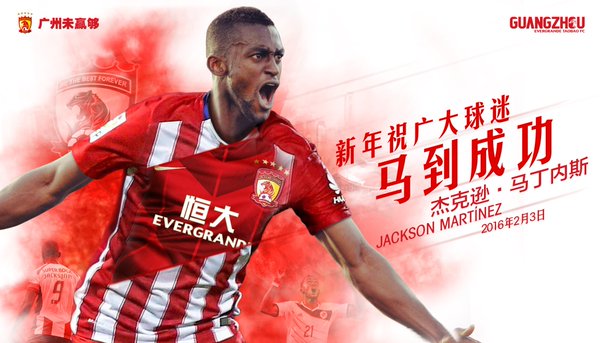
Jackson Martinez moved from Atlético Madrid to Guangzhou Evergrande – Image via Mirror
The stunning transfers that were conducted by the CSL are reminiscent of the early 2000s when both Ukrainian and Russian clubs emerged as serious contenders on the world transfer market. Due to the war in Ukraine and the economic crisis in Russia, however, the post-Soviet clubs lack the buying power they once possessed.
Chinese Super League Also Targeted Yarmolenko and Hulk
Furthermore, Chinese clubs have targeted some of the most talented players of the region. The February 4 transfer of the above mentioned Alex Teixeira from Shakhtar to Jiangsu Suning was the most expensive transfer of the winter break.
Then on February 19, Futbolgrad reported that a Chinese club had also made an offer for Dynamo Kyiv’s star Andriy Yarmolenko. Dynamo’s president Ihor Surkis claimed that the offer was in the region of €60 million, which, if true, would have surpassed Alex Teixeira’s transfer to China. Dynamo and the player, however, rejected the offer.
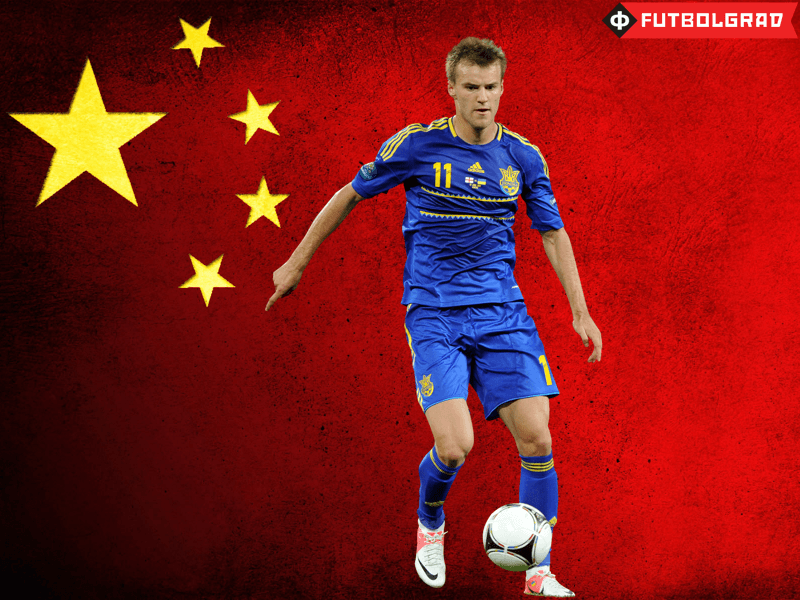
Dynamo Kyiv have recently rejected an offer from China for Yarmolenko
Another player, who was targeted, was Zenit Saint Petersburg’s Brazilian star Hulk. As Futbolgrad reported on February 1, Zenit had received an offer in the region of €30 million for Hulk—reportedly Hulk would have earned €20 million a year in China—yet Zenit, fuelled by the gas giant Gazprom, was able to resist the offer from China.
Zenit Convinced Hulk not to move to China
The Russian sports paper Sport-Express spoke with Zenit’s general director Maksim Mitrofanov about the transfer dealings of Chinese clubs. When asked whether Zenit had received an official offer, Mitrofanov answered, “Yes we did [receive an offer], of €30 million. We received the proposal on the last day of the [European] transfer window. Our response was: ‘Thank you, but no.’ Things aren’t done this way.”
To a question about about Hulk’s salary offer of €20 million, Mitrofanov responded, “Here is my answer to this: the colleagues in the Chinese market do not handle this correctly, as they try to get into players heads by offering huge sums. This tactic is used by them.” Mitrofanov further explained that Chinese clubs often approach players without speaking to the clubs first. “A man who does not have a direct relationship to the club comes in and says, ‘Hey friend…’ and draws a huge figure on a piece of paper. After that players start to think. The approach must be understood of course.”
Mitrofanov also explained that Zenit had to convince Hulk not to leave the club. “I don’t want to comment on the details, but we had a sit down, and talked with Hulk about the situation. We understand that this is difficult to live with.”
Meanwhile the German transfer portal transfermarkt.de had a talk with Shanghai Greenland Shenhua’s club boss Jun “Bruce” Zhou. Zhou admitted, “It is a question of money—that is what decides everything in the end. We often pay three times the amount of what is normal in Europe.” Zhou further explained, “Our league needs these stars in order to become a major competition. They make the competition more interesting, and they bring the quality that allows Chinese players to develop their game, and to become top players themselves. Furthermore, the transfer of these top stars caused a major stir. Now everyone talks about the Chinese league! That is great advertising for our country.”
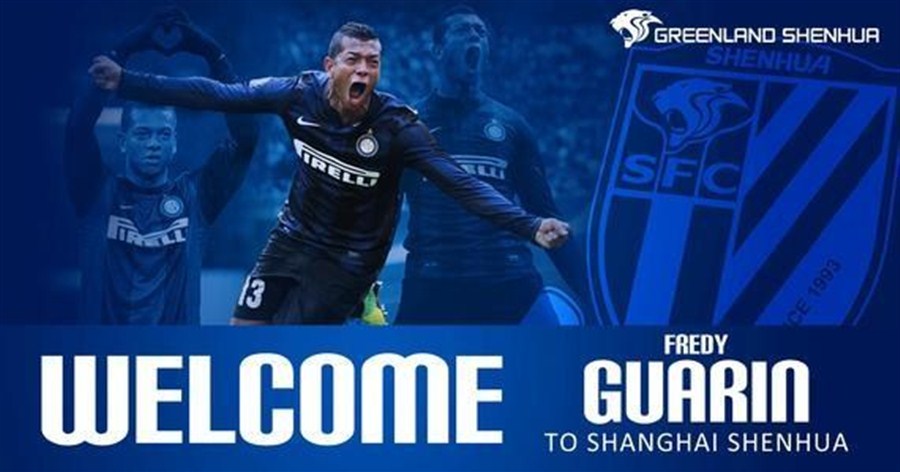
Fredy Guarín moved from Inter Milan to Shanghai Greenland Shenhua – Image via shanghaidaily.com
Zhou further believes that Chinese club’s will continue spending in the summer transfer window. “Of course players want to secure their financial futures. We know this; it is give and take. We need these stars to develop [football in our country]. But we also know that we wouldn’t be able to get these players, if we payed the same amount as European clubs.”
The Financial Expansion of the Chinese Super League will have major consequences on European Football
Mitrofanov believes that the expansion of the Chinese into the European market will have major consequences for European football as a whole. With this in mind, Mitrofanov believes that UEFA should take a look at the Financial Play Regulations in European football. “The summer transfer campaign in China will certainly be like the winter strategy, and perhaps even more difficult to predict. One of the arguments that we presented at meetings with UEFA in terms of Financial Fair Play was the fact that the football market is a [global] one. It is, therefore, essential that [Financial Fair Play] rules apply worldwide. And all must have the same regulations.”
Mitrofanov has admitted that Zenit are in close contact with UEFA over the club’s spending. Zenit, like many Russian clubs, are under close scrutiny by the European government body regarding spending—Russian clubs have struggled due to the fact that the rouble has dropped in value and that most top players are paid in foreign currency. The Chinese market, also, has experienced a huge financial slowdown for some time. China’s currency, the Yuan, has been in turmoil as has the Russian rouble—the Yuan has declined rapidly compared to other major currencies.
In some ways, the huge investments into Chinese clubs in recent months can be explained both as a marketing tool, and also as a way for the owners of the clubs—in most cases large Chinese conglomerates—to secure and diversify their financial portfolios in times of financial uncertainty. Because Chinese clubs don’t fall under UEFA’s Financial Fair Play regulations, they can spend without having to worry about running a deficit.
Mitrofanov believes that this puts clubs like Zenit at a disadvantage as, in theory, Gazprom, despite the financial crisis in Russia, could provide almost unlimited funds to Zenit to compete both in the Russian Football Premier League and the UEFA Champions League. Mitrofanov is also of the opinion that Zenit will not be the only club to struggle with China’s unchecked football market.
Zenit Wants Changes to Financial Fair Play Regulations
Mitrofanov has stated, “Currently, UEFA, undoubtedly, is the leading market in world football. But some players have already left and, in the future, there may be more. Thanks to these players the level and attractiveness of China’s championship can grow, and might, therefore, no longer just attract second and third tier players, and players that are close to retirement, but also stars in their prime. Hence, our argument is that Financial Fair Play must be adapted, and should no longer destroy clubs.”
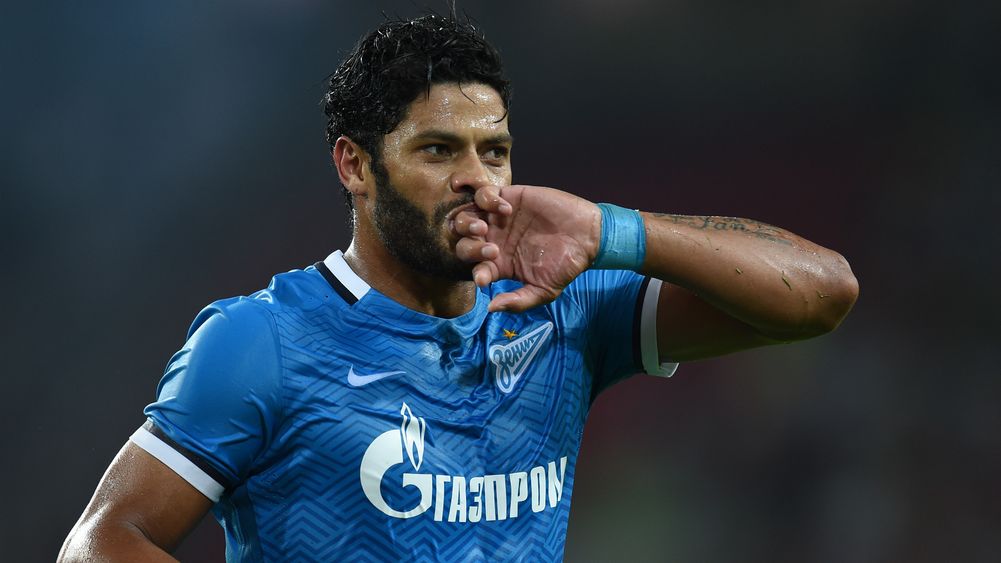
Zenit and Mitrofanov have convinced Hulk to stay at Zenit – Image via beinsports.com
Mitrofanov has a point. When UEFA’s Financial Fair Play regulations were first introduced in 2009 they had the following objectives:
- to introduce more discipline and rationality in club football finances
- to decrease pressure on salaries and transfer fees and limit inflationary effect
- to encourage clubs to compete with(in) their revenues
- to encourage long-term investment in the youth sector and infrastructure
- to protect the long-term viability of European club football
- to ensure that clubs settle their liabilities on a timely basis
The emergence of China, however, constitutes a major threat to UEFA’s Financial Fair Play regulations. Zenit, and their owner Gazprom, may not be the only club that have spoken to UEFA about the danger of the unregulated Chinese market. Furthermore, the fact that Gazprom—a major sponsor of both UEFA and FIFA—owns Zenit will likely cause the European governing body to take Zenit’s concerns seriously.
At the same time, however, this does not mean that UEFA Financial Fair Play regulations will come to an end any time soon. The new president of FIFA Gianni Infantino was one of the key players at UEFA when Financial Fair Play was introduced, and is understood to be a big proponent of the regulation. Infantino is also understood to have close ties to Russia’s governing body and, therefore, it is likely that Mitrofanov’s proposal to expand FFP globally could be supported at FIFA.
Manuel Veth is a freelance journalist, and PhD candidate at King’s College London. Originally from Munich, Manuel has lived in Amsterdam, Kyiv, Moscow, Tbilisi, London, and currently is located in Victoria BC, Canada. His thesis is entitled: “Selling the People’s Game: Football’s transition from Communism to Capitalism in the Soviet Union and its Successor States”, and will be available to readers later this year. Follow Manuel on Twitter @homosovieticus.


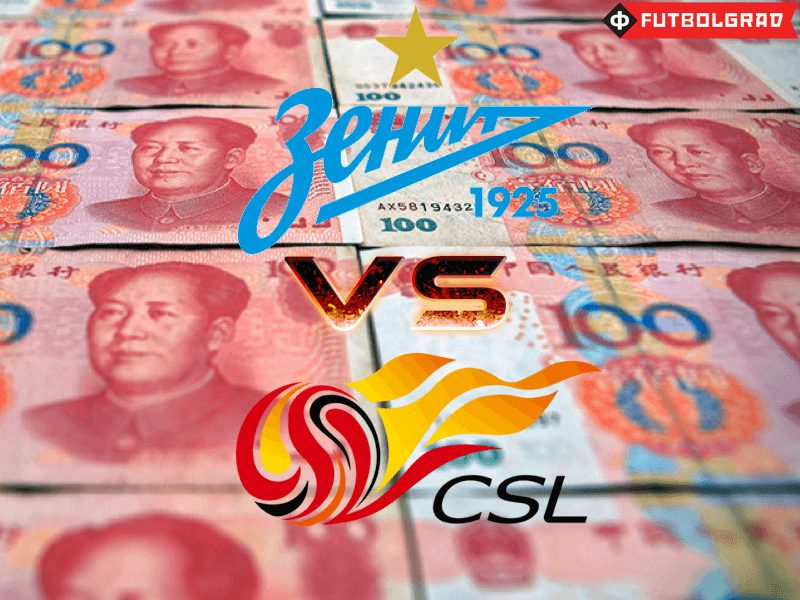

















COMMENTS